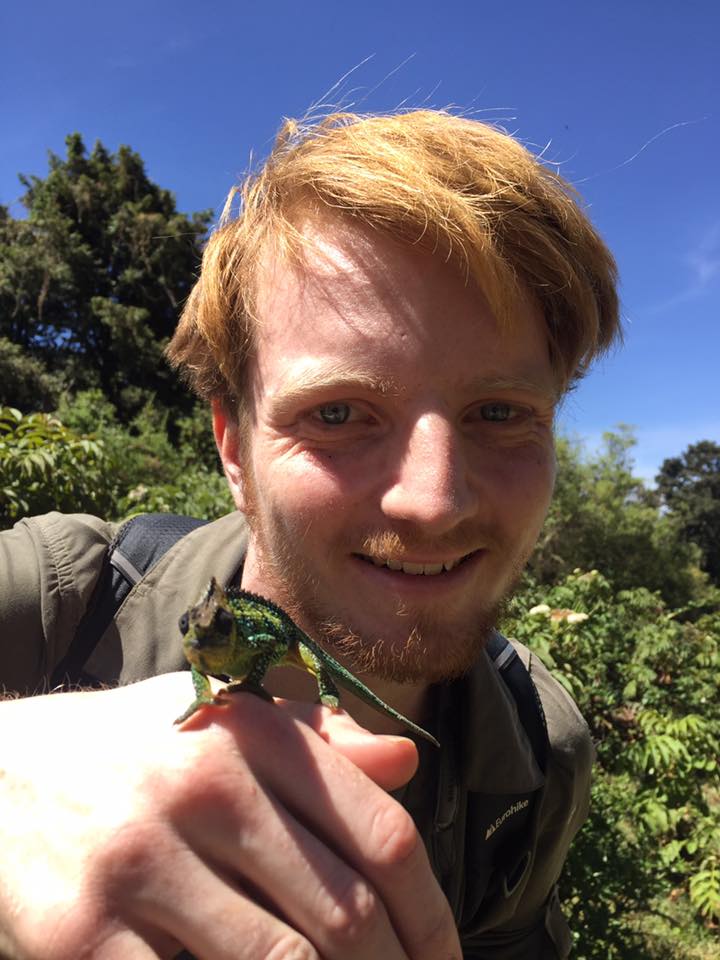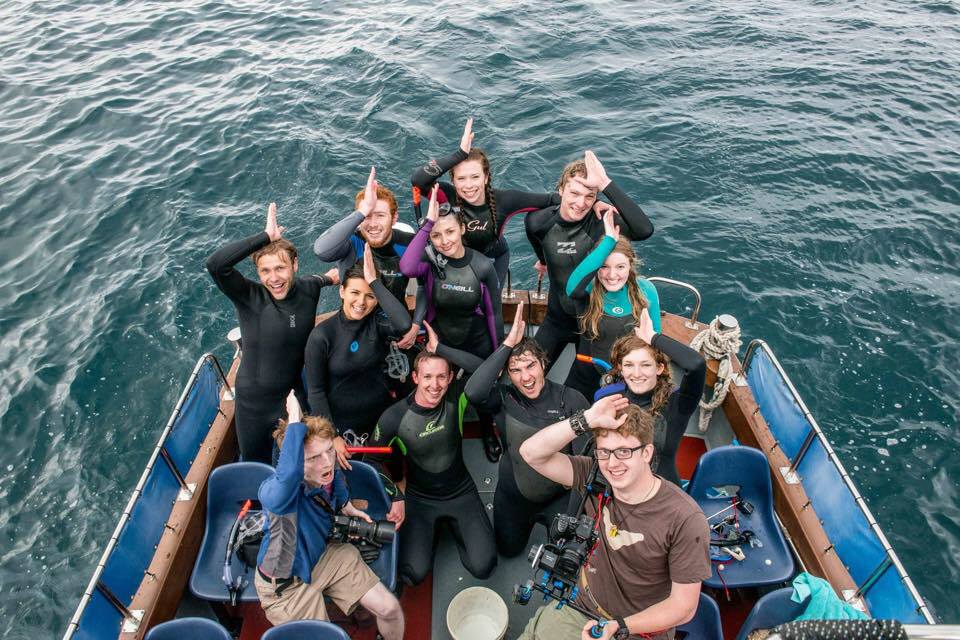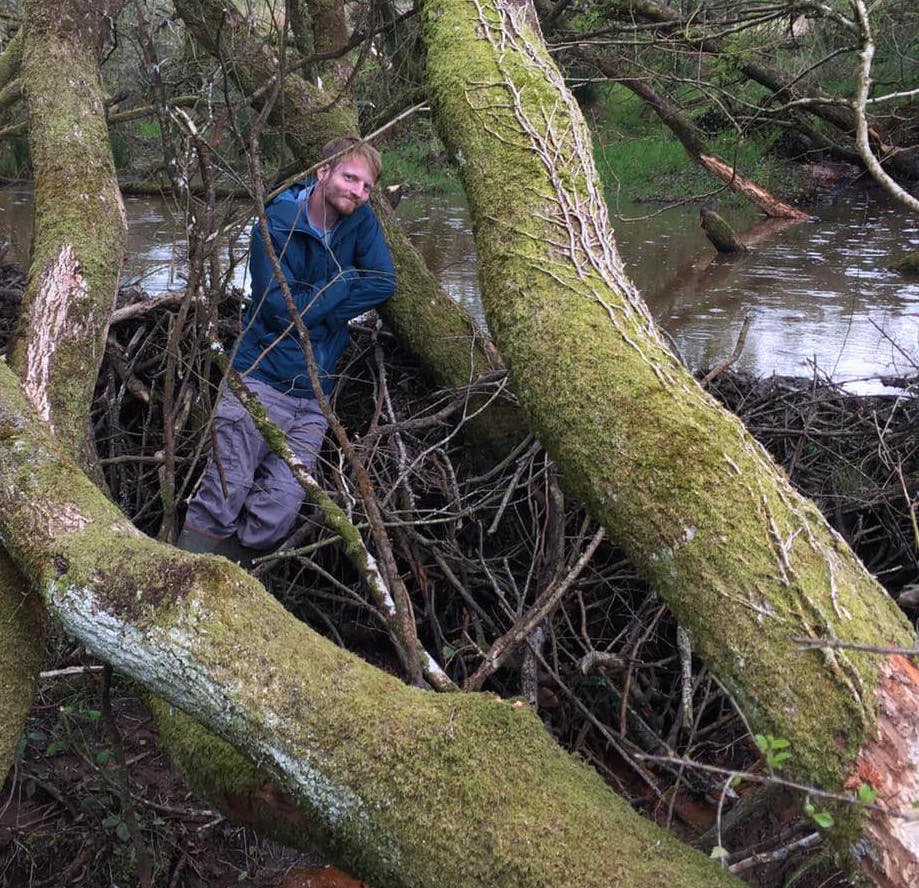We are looking back on some of our BSc graduates who have excelled in scientific research, ecology and conservation around the world since studying with us.
Today we meet Peter who graduated from BSc Zoology in 2016 and is now an ecologist and researcher with the Derek Gow Consultancy, developing captive breeding and reintroduction programmes for UK species
 Hi Peter, it’s been a few years since you studied with us, why don’t you tell us a bit about your career in that time that led you to where you are now?
Hi Peter, it’s been a few years since you studied with us, why don’t you tell us a bit about your career in that time that led you to where you are now?
While I was studying at Penryn Campus, I initially did my second-year workplace learning module as a keeper at the DGC, and I carried on volunteering and occasionally taking cover shifts in this role at the same time as my studies, along with joining some water vole reintroduction days in the field and generally making it clear I was a keen bean! This lead to the offer of part-time work, and very recently the extension to full time. While I was part-time, I also spent much of 2019-2020 working as a Ranger at the Wild Place Project, based within the Bear Wood exhibit.
We are glad you have had such great opportunities, what attracted you to study your BSc at the University of Exeter, Penryn Campus?
With the Penryn Campus, the location was undoubtedly a huge factor. I’ve got relatives in Cornwall and been in love with the place all my life, and the opportunity to live here and be within easy access of some incredible natural landscapes – such as valleys of Atlantic rainforest, the Mediterranean scrub of the Lizard Peninsula, and of course the dramatic coastline that is so distinctly Cornish. I’ve always been a naturalist at heart, so the chance to be within an easy drive of these habitats and observe their denizens in my own time was a huge draw. And undoubtedly the fact that there isn’t an emphasis on zoology and biology at the cellular, lab-based level. I struggled massively with this in A-Level Biology, and I’m much more at home in hiking boots than a lab coat! This appeared to be a draw back of many other similar courses elsewhere, and while there is a bit of it at Penryn the emphasis is on ecology, behaviour and fieldwork, looking at the natural world in the holistic way it works and what appeals to me about it.
What are your highlights from studying at the University of Exeter?
In the four years at Penryn, I had many memorable experiences watching adders, choughs, seals, basking sharks and many more. The otter and Cornwall’s surprise visit from a Dalmatian pelican in my third year are particular highlights! The lecturers all make you feel like you belong to one unit, and you don’t get the impression you’re another part of the job to tick off – they genuinely want the best for you and are very easy to reach out to as we almost felt like part of the team. As mentioned, the field emphasis was a huge relief, from the essential field skills course in my first year through to workplace learning modules, having flexibility to design my own methods for research projects and of course the amazing field courses both across the UK and overseas.

What did you enjoy most about studying your BSc in Penryn?
I’ll always remember my first year living on campus fondly; the large, airy flats with their double en-suite rooms were a far cry from my parents uni accommodation horror stories! Moving to Falmouth in second year onwards was even better, and while it may not be everyone’s idea of a classic university experience in a city, the life you all make for yourselves there is brilliant in its own right and I wouldn’t change it for the world. Let’s face it, a beach and the bounty of characterful pubs is far better deal than a Nando’s and clubs that open past 2am (and let’s face it, Club I and Mangos are great in their own unique ways!). We had a ‘secret ledge’ that overlooked Falmouth Bay, and on a summer’s day after some cliff jumping, we would set up a barbecue followed by a campfire as the sun went down, and as the sea twinkled in the moonlight below us I’d think that I couldn’t have chosen anywhere else I’d rather be.
How do you think studying at the University of Exeter helped to prepare you for your career?
For a start, one of my modules was my first experience with my current workplace! I volunteered once a week at Derek Gow Consultancy as part of my workplace learning module in second year, assisting the husbandry of the many native mammal and bird species there including the water vole conservation breeding programme. This lead to more volunteering after the module was finished, taking occasional cover work and assisting on releases, before eventually landing my job. I also found that the broad but highly important technical aspects the university taught, such as how to correctly report findings, critical thinking and presentation skills, have been invaluable and would be difficult to gain effectively elsewhere.
Are there any particular skills that have been beneficial to your career in consultancy?
While the scientific training is undoubtedly at its core, it is skills you might not immediately think of when applying for a degree, but prove to be crucial once in the working world, that I’m very glad to have gained from my course. Chief among these are correct reporting of practice and how to make a grant application; crucial in nature conservation!
Why did you choose a career in consultancy and do you have any advice for students looking to pursue something similar?

I have wanted to work with animals and nature for as long as I can remember, and certainly since childhood I decided that I specifically wanted to focus on breeding and reintroductions of our native wildlife, so I feel incredibly fortunate to be have been able to work towards realising this very niche dream! There are two particularly satisfying elements. One is being able to be around these animals on a regular basis and learn what makes them tick – rearing glow-worms from egg to adult for example is a process in first-hand understanding of a species’ biology that would be very difficult to get in the field. And then there is seeing a project go full circle. Reintroductions are complex and most I’m working on are in early development or middle stages, but with the harvest mouse releases I lead at a National Trust estate I have been there from initial habitat scoping, releasing the animals, through to finding signs that the mice are establishing and breeding in later seasons. There is a feeling of relief and joy not quite like anything else.
My advice would be to volunteer as much as you can with the practical side of it. There isn’t much going on in the way of reintroductions, but the skills you can gain as a zookeeper, wildlife rehabilitator or a species-focused ecologist are very transferable to this field and put you in very good stead, and these fields often need voluntary help. Keep your mind open, work hard and remember it’s not all glamorous work, and you’ll be on the right path. And with conservation, social skills and politics are just as important as the biological element. Communication skills, how to work with or bring on board people who will often have the opposite point of view and navigating the politics are part and parcel, so don’t go thinking you can just run off and spend all your time with nature! But the pay-off is so worth it.
Thank you Peter!
If you want to read more profiles from BSc Zoology graduates follow this link or explore our Graduate in Focus homepage to learn more about the degree programmes we have on offer!

